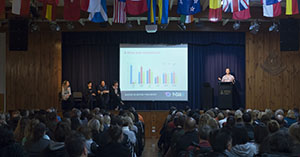Andrew Kinch is the founder of GameAware. He says video games – in the right measure – can help young people meet some important psychological needs.

“Gamers have been stigmatised over the years. There used to be a time when people wouldn’t admit to their friends that they played video games. Once an underground subculture, in 2017 these games were a $109 billion industry.
“Gamers often feel the need to become defensive when they’re told that their passion is a waste of time. After that, anything that is true about the harms of excessive gaming is completely ignored. It’s a polarised debate between those who play and those who blame video games as the cause of gaming disorders. The truth lies somewhere in the middle and is often complex.
“Gaming is a great form of entertainment, but we must be on top of our self-regulation skills, especially when the motivation to play is to escape real life. When gaming becomes a coping mechanism to seek relief from pain, it can become excessive and problematic. People can choose gaming to attempt to meet their needs. When you combine this with easy access and the game mechanics that entice players to keep coming back, you can see how an individual might be motivated to live in the virtual world.
“In my experience, video games hit three motivational needs for young people: competence, autonomy and relatedness.
“Competence is the feeling of mastery. Everyone wants to be good at something and video games allow you to become good at something quickly. If I want to be good at basketball it can take years – with video games, it takes months and you do it without breaking a sweat.
“Secondly, teenagers and children don’t have a lot of autonomy in their lives. In a game, they have freedom over their own choices and can express themselves creatively. They can customise their characters and develop a second identity if they choose.
“Every multi-player game meets the third need, which is relatedness or social connection. When you play with other people – in a competitive or collaborative way – you feel part of something bigger than yourself. You are part of a gamer community. Gaming can allow kids to build self-confidence because the community is accepting of people from all walks of life and any age.
“I’d argue that you can’t completely fulfill psychological needs through video games. Real life will always provide us with the opportunity to feel more fulfillment from competence, autonomy and social connection.”
3 Things You Can Try Now
1. Do a 10-day gaming challenge – go cold turkey and stay away from games and gaming culture.
But parents can’t just yank the Wi-Fi. It must be something the gamer decides to do to test the commonly spoken phrase – “I could stop if I wanted to, I just don’t want to”. The challenge is about helping a gamer help themselves. Even if they don’t reach 10 days, you get information as
to whether they can control themselves. However, three
or four days in to the challenge, gaming’s grip tends to
be loosened!
2. Parents need to play video games with their kids.
Get coached and get a better understanding of the nuance in the games your child plays. Be a spectator from time to time to show interest. If you take your child to soccer and watch them play, they feel valued and it’s the same if they see you are taking their gaming seriously. Take down defensive walls by getting involved. The conversation about gaming changes when parents are not considered the opposition.
3. Set up social gaming sessions to be shoulder-to-shoulder with friends.
When we game in the same room and play the same game, the dynamic is more exciting and provides a level of connection that online gaming isn’t quite able to provide.



